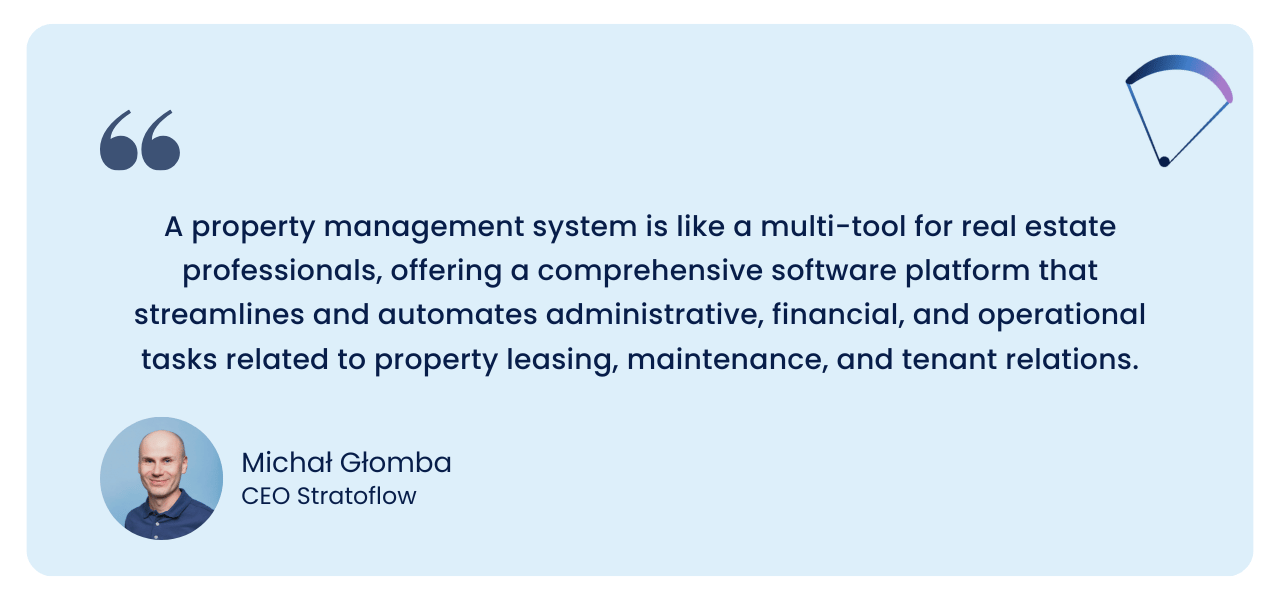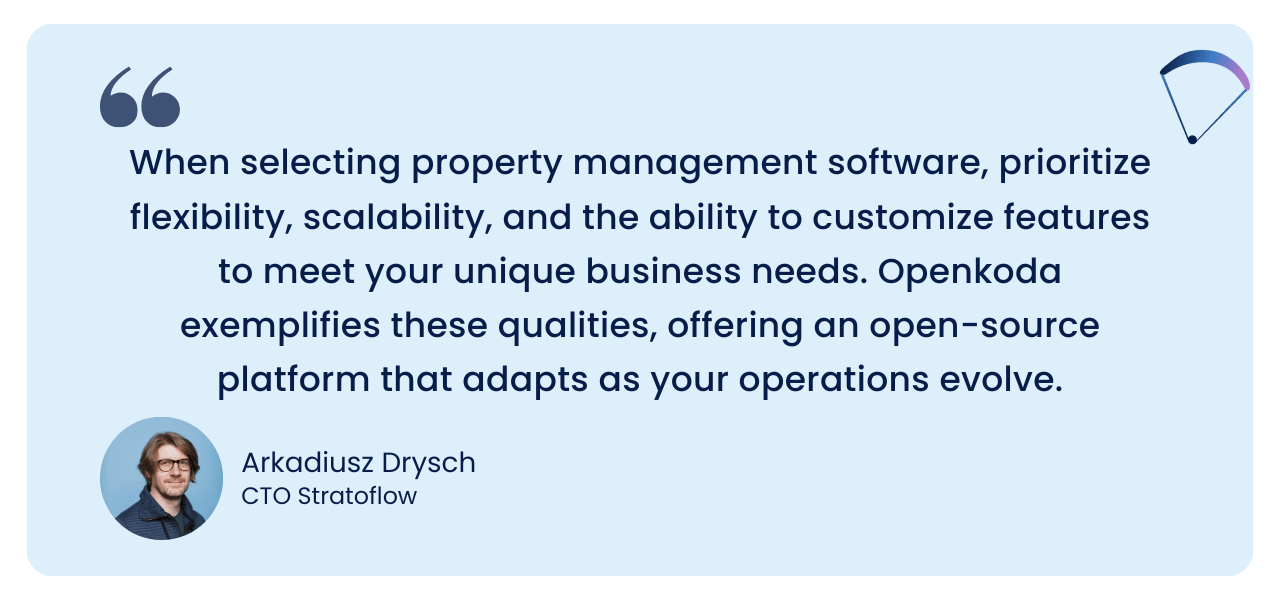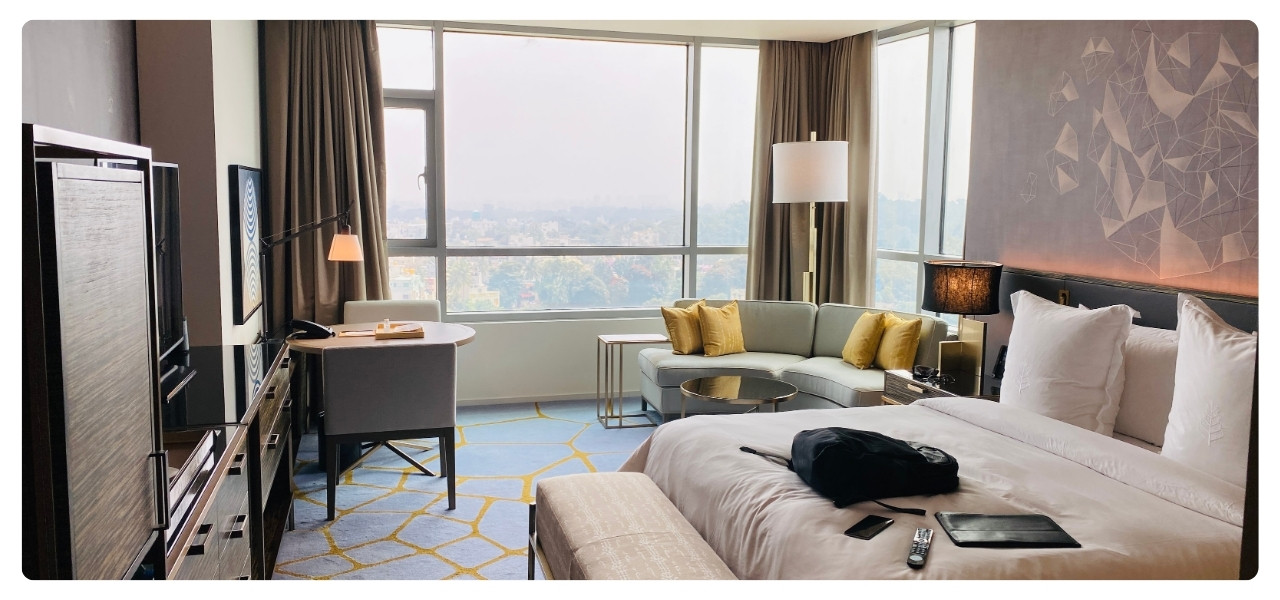
The Ultimate Guide to Property Management System: A 2024 Overview
A Property Management System (PMS) is a comprehensive software solution that helps property owners, operators, and managers streamline various aspects of managing their hospitality properties, such as hotels, resorts, vacation rentals, or hostels.
The PMS automates administrative tasks, centralizes property data, and simplifies daily hotel operations, ultimately improving efficiency and enhancing the guest experience.
Contents
- What is a property management system?
- Key statistics about property management systems
- 10 latest innovation trends in property management systems
- The most popular property management systems
- How to implement a property management system step by step
- Benefits of using a property management system
- Challenges associated with property management systems
What is a property management system?
A property management system (PMS) is a software application designed to streamline and automate various tasks and processes associated with managing property assets.
These systems are typically used in the hospitality and real estate industries, helping property managers and owners handle reservations, financial reporting, guest check-ins and check-outs, and other day-to-day administrative tasks.
At its core, a PMS centralizes essential data, enabling property managers to view and manage multiple operations from a single platform, which improves efficiency and accuracy in handling the diverse needs of any property, whether it’s a hotel, rental property, or corporate asset.
Having a property management system can be transformative for your business.
First and foremost, it drastically reduces the manual effort needed to keep things running smoothly.
With a PMS, you can automate repetitive tasks, such as payment processing, generating invoices, and sending notifications, allowing your team to focus on more strategic and customer-centered activities.
Real-time analytics and reporting capabilities allow you to monitor key metrics, such as occupancy rates, revenue per available room, and guest demographics, which you can use to make more informed, strategic decisions.
By using a PMS to track guest preferences, past visits, and special requests, you can provide more personalized services that improve customer satisfaction and loyalty.

So what functionalities a good property management system need to have?
Here are key features that you should look into:
Reservation management
A PMS allows you to manage bookings from multiple sources, such as direct bookings, online travel agencies (OTAs), and walk-ins, all in one centralized reservation system.
It provides real-time updates on room availability, guest information, and booking status.
Front desk operations
The PMS streamlines front desk operations by automating tasks like check-ins, check-outs, room assignments, and guest registration. This helps improve the efficiency of the front desk staff and allows them to focus on providing excellent guest service.
Housekeeping and maintenance management
A PMS can help manage housekeeping tasks, room inventory, inspections, and maintenance schedules. It assigns tasks to staff members, tracks their progress, and updates room status in real-time, ensuring that rooms are always clean and well-maintained.
Rate and revenue management
The PMS helps property owners and managers optimize their pricing strategies by analyzing market trends, demand patterns, and competitor rates.
It also allows for dynamic pricing, which adjusts room rates in real-time based on factors such as occupancy levels and booking patterns. Read more about Hotel Revenue Management and Yield Management Systems.
Integration with other systems
A PMS can integrate with various other systems, such as the channel manager, managers, booking engines, hotel booking engine, and point-of-sale (POS) systems, to create a seamless and efficient workflow across all departments.
Guest communication and experience
The PMS can store all guest profiles, preferences and history, enabling personalized communication and targeted marketing.
It can also automate guest communications, such as pre-arrival emails, welcome messages, and post-stay surveys.
Reporting and analytics
A PMS provides detailed reports on key performance indicators (KPIs) like occupancy rates, average daily rates (ADR), and revenue per available room (RevPAR). These insights can help property owners and managers make data-driven decisions to optimize their operations and revenue.
Security and data protection
A PMS often incorporates robust security measures, such as data encryption and secure user access controls, to protect sensitive guest data and information and ensure compliance with data protection regulations.
[Read also: How to Choose the Best Travel Agency Software to Maximize Your Revenue]
Key statistics about property management systems
Selected key statistics about property management systems:
Market size and growth
According to a report by Fortune Business Insights, the global property management software market size was valued at USD 1.72 billion in 2020 and is projected to reach USD 4.54 billion by 2028, growing at a CAGR of 12.9% during the forecast period (2021-2028).
A market research report by Technavio indicated that, between 2020 and 2024, about 75% of the growth in the property management software market was expected to come from cloud-based solutions.
Market segmentation and trends
The property management system (PMS) market is experiencing significant growth, with North America currently holding the largest market share, followed by Europe and the Asia-Pacific region.
Notably, the Asia-Pacific region is expected to see substantial expansion in the coming years, driven by increasing technology adoption in the hotel industry and growing urbanization. Additionally, the shift towards cloud-based solutions is a major trend, with approximately 75% of market growth between 2020 and 2024 attributed to these platforms.
This trend underscores the industry’s move towards more scalable and accessible property management solutions.
Property Management Systems: Custom vs. Out-of-the Box
When selecting a property management system (PMS), you typically face a choice between custom-built solutions and out-of-the-box software.
Custom-built systems are tailored to your specific business needs, offering flexibility and the ability to integrate unique features.
However, they often require significant time and financial investment for development and maintenance.
On the other hand, out-of-the-box solutions provide ready-made functionalities that can be quickly deployed, making them cost-effective and efficient for standard operations. The downside is that they may lack the flexibility to adapt to your unique business processes and might include unnecessary features that add complexity.
Openkoda: Best of both worlds
Openkoda offers a balanced approach by combining the advantages of both custom and out-of-the-box systems.
As an open-source platform, Openkoda provides a robust foundation with pre-built functionalities, such as user management, multitenancy, and an admin dashboard, which accelerates development and reduces costs.

Its open-source nature allows for extensive customization, enabling you to tailor the system to your specific requirements without being locked into a vendor’s ecosystem.
This flexibility ensures that as your business evolves, your PMS can adapt accordingly, providing a scalable and efficient solution that aligns with your unique operational needs.
Sounds interesting?
Key innovation trends in property management systems
Property management systems (PMS) have evolved significantly over the years due to digital transformation in real estate, integrating new technologies, and trends to meet the growing demands of the real estate industry.
Here are some key innovation trends in property management systems.
Trend #1: Cloud-Based Systems
The shift to cloud-based PMS solutions offers significant advantages over traditional on-premises systems.
Cloud platforms provide scalability, allowing your system to grow alongside your business needs without substantial infrastructure investments.
They also facilitate remote access, enabling you and your team to manage properties from any location with internet connectivity.
Trend #2: Integration of IoT Devices
Incorporating Internet of Things (IoT) devices into property management introduces a new level of automation and control.
Smart thermostats, lighting systems, and security cameras can be integrated into the PMS, allowing for centralized monitoring and management.
Trend #3: Advanced Analytics and Reporting
Modern PMS platforms are increasingly equipped with advanced analytics and reporting tools. These features enable you to gain deeper insights into property performance, tenant behaviors, and market trends.
For instance, Openkoda offers robust analytics capabilities that allow for customized reporting, helping you make informed decisions based on real-time data. By leveraging these insights, you can identify opportunities for improvement, optimize operations, and enhance tenant satisfaction.
Trend #4: Mobile Applications
The development of mobile applications for PMS platforms has revolutionized property management by providing on-the-go access to essential functions.
With mobile apps, you can handle tasks such as approving maintenance requests, communicating with tenants, and viewing financial reports directly from your smartphone or tablet. This mobility ensures that critical operations are not delayed, improving responsiveness and overall efficiency.
Trend #5: Artificial Intelligence and Machine Learning
The integration of artificial intelligence (AI) and machine learning into PMS platforms is transforming how data is utilized.
These technologies enable predictive maintenance by analyzing patterns to foresee equipment failures, allowing for proactive interventions.
Openkoda’s reporting AI exemplifies this trend by providing intelligent data analysis and reporting features, offering actionable insights that drive strategic decision-making.
The most popular property management systems
There are numerous property management systems (PMS) available in the market, each offering a unique set of features and capabilities.
When selecting a property management system, consider factors such as the size and type of your property portfolio, specific features and functionality required, integration capabilities, and budget.
Here are some popular PMS solutions:
Openkoda Property Management System

Openkoda Property Management System is an open-source platform designed to streamline property management operations for real estate professionals.
It offers a customizable and scalable solution that adapts to the unique needs of property managers and landlords, enhancing efficiency and tenant satisfaction.
Key Features
- Tenant Screening: Facilitates comprehensive screening processes, including pre-defined questionnaires and detailed assessments, to ensure reliable tenant selection.
- Custom Dashboard: Provides a personalized dashboard with real-time updates on rent payments, expenses, and maintenance requests, allowing for efficient property oversight.
- Maintenance Management Tool: Enables tenants to report maintenance issues directly through the platform, streamlining communication and ensuring timely resolution of problems.
AppFolio Property Manager
AppFolio Property Manager is a comprehensive, cloud-based property management software designed to streamline and automate key processes for property management businesses.
It caters to various property types, including single-family, multifamily, commercial, student housing, and community associations, providing tools to enhance efficiency and effectiveness in property management operations.
Key Features
- Online Rent Payments: Allows tenants to pay rent electronically, reducing manual processing and improving cash flow.
- Maintenance Management: Facilitates the tracking and resolution of maintenance requests, ensuring timely responses and tenant satisfaction.
Buildium
Buildium is a cloud-based property management software designed to streamline operations for property managers and real estate professionals.
It offers a comprehensive suite of tools to manage various property types, including residential, commercial, and community associations, enhancing efficiency and tenant satisfaction.
Key Features
- Property Accounting: Provides purpose-built accounting tools to manage finances effortlessly, including automated bookkeeping and financial reporting.
- Online Payments: Facilitates electronic rent and fee collections, allowing tenants to make payments online, thereby improving cash flow and reducing manual processing.
Yardi Voyager
Yardi Voyager is a comprehensive, web-based property management platform designed to meet the diverse needs of real estate operators managing various property types, including multifamily residential, commercial, affordable housing, and more.
It integrates property management and accounting functionalities into a single database, enhancing operational efficiency and data accuracy.
Key Features
- Integrated Accounting: Provides a full-featured accounting system that meets all applicable GAAP and IFRS requirements, ensuring accurate financial management.
- Automated Workflows: Streamlines operations by automating tasks such as leasing, move-ins and move-outs, work orders, and purchase orders, improving efficiency and reducing manual errors.
Rent Manager
Rent Manager is a comprehensive property management software designed to streamline operations for property managers handling diverse portfolios, including residential, commercial, and short-term rentals.
Key Features
- Double-Entry Accounting: Provides a robust accounting system that ensures accurate financial tracking and reporting, facilitating sound financial management.
- Maintenance Management: Enables efficient scheduling and tracking of maintenance tasks, ensuring timely responses to issues and maintaining property standards.
MRI Software
MRI Software is a comprehensive property management platform designed to meet the diverse needs of real estate professionals managing various property types, including residential, commercial, and mixed-use portfolios.
It offers a suite of integrated tools to enhance operational efficiency and strategic decision-making.
Key Features
- Integrated Accounting: Provides robust financial management capabilities, including accounts payable and receivable, general ledger, and financial reporting, ensuring accurate and efficient financial operations.
- Lease Management: Facilitates comprehensive lease administration, allowing for the tracking of lease terms, renewals, and compliance, thereby optimizing occupancy and revenue.
ResMan
ResMan is a comprehensive property management software designed to streamline operations for property managers and owners.
It’s particularly well-suited for those managing multifamily residential properties, offering a suite of tools that cover leasing, accounting, maintenance, and compliance.

How to choose the right property management system for your company
Choosing a new property management system can be a complex process, but with thorough planning, stakeholder involvement, and ongoing support, you can successfully transition to a more efficient and effective system.
A practical step-by-step guide to implementing a PMS:
Step #1: Define Your Requirements
Start by identifying the specific features and functionalities your business needs from a PMS.
Consider factors like property type, tenant communication, accounting needs, and maintenance tracking. A clear list of requirements will help you evaluate systems more effectively and ensure they align with your operations.
Step #2: Research and Shortlist Solutions
Investigate the available PMS options, including both out-of-the-box and customizable solutions like Openkoda.
Compare the features, pricing, and scalability of each system. Reading user reviews and case studies can offer valuable insights into how each option performs in real-world scenarios.
Step #3: Evaluate Integration Capabilities
A good PMS should integrate seamlessly with other software your business uses, like accounting tools, IoT devices, and tenant communication platforms.
Look for systems that support easy integrations to avoid disruptions in your workflow and enhance overall efficiency.
Step #4: Consider User Experience and Training Needs
Ensure that the PMS you choose is user-friendly for both your team and tenants.
Conduct a demo or trial period to gauge the system’s usability and identify any training requirements. Some providers offer extensive training resources to help your team get up to speed faster.
Step #5: Plan the Implementation and Rollout
Develop a structured implementation plan, including a timeline for data migration, setup, and training.
Gradual rollouts often work best to minimize disruptions. Regularly gather feedback during the rollout phase and make adjustments as necessary to optimize performance.
[Read also: What is a GDS]
Benefits of using a property management system
Using a property management system (PMS) offers numerous benefits for property managers, landlords, and real estate organizations.
By offering improved organization, time savings, better communication, and enhanced decision-making capabilities, a modern property management system can significantly improve the efficiency and effectiveness of property management operations.
Key benefits of using a property management system:
Improved organization
A PMS helps centralize and organize property-related data, making it easier to access and manage.
This leads to better decision-making and more efficient business operations.
Time savings
A PMS automates many routine tasks, such as collecting rent, lease management, and maintenance requests, reducing the time spent on manual processes and freeing up time for more strategic activities.
Enhanced tenant communication
PMS solutions often include tenant communication tools, such as messaging systems, portals, and mobile apps, which improve communication and streamline interactions between property managers and tenants.
Better financial management
PMS solutions often include robust financial management tools, such as accounting, budgeting, and reporting features, which help property managers effectively track income, expenses, and overall financial performance.
Increased tenant satisfaction
By streamlining processes like maintenance requests, rent payments, and lease renewals, a PMS can contribute to improved tenant satisfaction and retention rates.
Data-driven decision-making
Modern PMS solutions offer advanced analytics and reporting capabilities, providing property managers with valuable insights to help optimize property performance and identify growth opportunities.
Enhanced marketing capabilities
A PMS can include marketing tools, such as vacancy advertising, listing syndication, and website and hotel inventory management software, which help attract and retain tenants more effectively.
Better maintenance management
PMS solutions often include maintenance management features, such as work order tracking, vendor management, and preventive maintenance scheduling, which help ensure properties are well-maintained and repairs are addressed promptly.
Remote access
Cloud-based PMS solutions allow property managers to access the system from anywhere and at any time, providing flexibility and enabling real-time collaboration among team members.

[Read also: What Are Travel Meta Search Engines?]
Challenges associated with property management systems
While property management systems (PMS) offer numerous benefits, there are potential risks associated with their implementation and use.
Some of these risks include:
Data security
Storing sensitive information, such as tenant data, financial records, and lease agreements, in a PMS can expose your organization to the risk of data breaches or unauthorized access.
It’s essential to select a PMS with robust security measures and ensure that your data is encrypted and regularly backed up.
System downtime
If a PMS experiences downtime or technical issues, it can impact your ability to access critical information and manage your properties effectively. Choosing a reliable PMS provider with a strong track record of uptime and responsive support is essential.
Integration challenges
Integrating a PMS with your existing systems and software tools, such as accounting software or IoT devices, can be complex and time-consuming. Poor integration can lead to inefficiencies and data inconsistencies. Ensure that the PMS you select offers integration capabilities that match your requirements.
Implementation costs
The costs associated with implementing a PMS can be substantial, including licensing fees, data migration expenses, training, and ongoing support costs.
It’s important to carefully evaluate the total cost of ownership (TCO) and ensure that it aligns with your budget and anticipated ROI.
Inadequate customization
If a PMS does not offer sufficient customization options, it may not fully align with your business processes and needs, reducing its effectiveness and potentially leading to inefficiencies.
Vendor reliability
The stability and long-term viability of the PMS vendor are crucial factors to consider. If a vendor goes out of business or discontinues support, it can leave your organization without critical updates, support, or even access to your data.
Data migration challenges
Transferring data from your existing system to the new PMS can be a complex and error-prone process. Data migration issues can lead to data loss or inconsistencies, impacting your ability to manage your properties effectively.
Compliance risks
Ensuring compliance with regulations, such as data protection laws and industry-specific requirements, is critical. A PMS that does not adequately address compliance requirements can expose your organization to legal and financial risks.
To mitigate these risks, it’s essential to thoroughly research and evaluate PMS options, involve relevant stakeholders in the decision-making process, develop a comprehensive implementation plan, and provide adequate training and support for staff during the transition.

Final words
Property management systems have revolutionized the real estate industry by streamlining operations, enhancing decision-making, and improving tenant satisfaction.
By adopting a PMS tailored to their specific needs, property managers and landlords can reap the benefits of increased efficiency, reduced costs, and improved tenant retention.
However, it is crucial to carefully assess the risks and challenges associated with implementing a PMS, such as data security, integration, and vendor reliability, to ensure a successful transition.
As technology continues to advance and the real estate software development possibilities evolve, PMS solutions will undoubtedly play an increasingly pivotal role in shaping the future of property management, offering innovative tools and features that further optimize and transform the way properties are managed.
Related Posts
We are Stratoflow, a custom travel software development company. We firmly believe that software craftsmanship, collaboration and effective communication is key in delivering complex software projects. This allows us to build advanced high-performance Java applications capable of processing vast amounts of data in a short time. We also provide our clients with an option to outsource and hire Java developers to extend their teams with experienced professionals. As a result, our Java software development services contribute to our clients’ business growth. We specialize in building bespoke travel solutions like fast search engines, metasearch engines, booking engine services or channel manager integrations.
